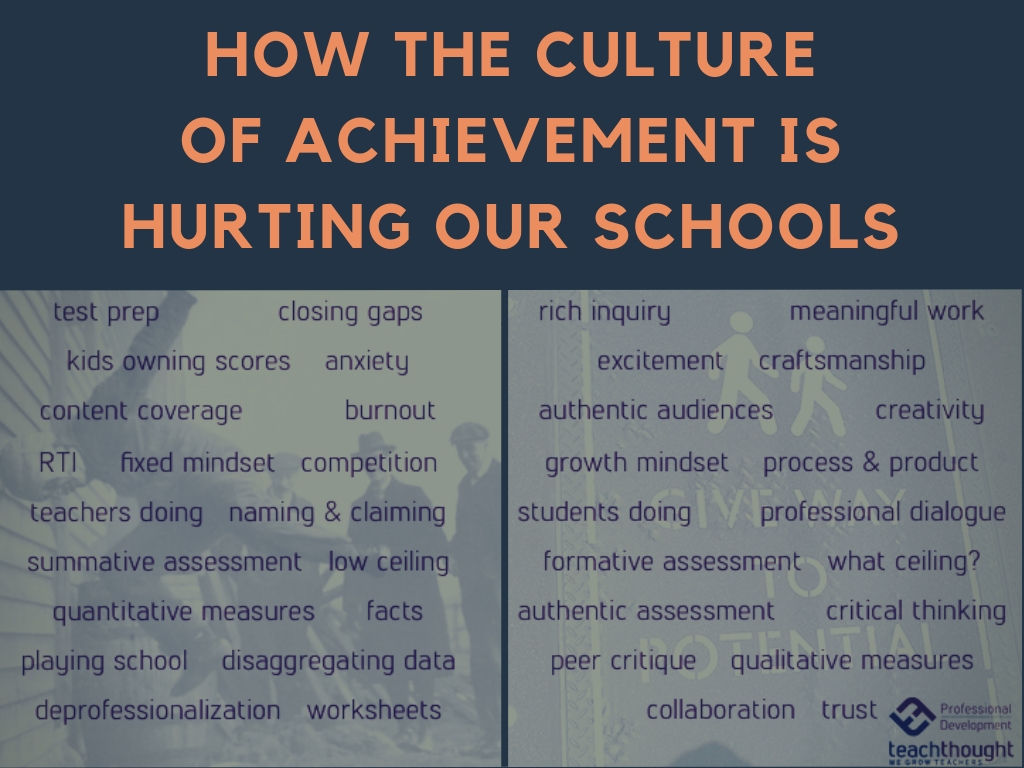The Culture Of Achievement Is Hurting Our Schools
contributed by Drew Perkins
Achievement sounds great doesn’t it? What parent doesn’t want their child to achieve? What teacher doesn’t hope their students achieve at a high level? Of course, achievement in general is a good thing but the Culture of Achievement created by high-stakes accountability measures is having a dangerous effect on education.
Culture of Teaching and Learning
What if we pursued a Culture of Teaching and Learning? One that placed an emphasis on things like deep, rich inquiry and craftsmanship? What if the learning had no ceiling and students were authentically assessed and did real-world work where they uncovered and discovered content? What if instead of disaggregating data our teachers engaged in quality professional discourse about their work in ways that excited them and their students?
A Culture of Teaching and Learning often produces great (test scores) achievement, but a Culture of Achievement rarely results in great teaching and learning. A Culture of Teaching and Learning rewards and professionalizes teaching and helps create students who are empowered by their possibilities and less than concerned with test performance.
If your school is looking to create great thinkers and learners and not just students stuffed full of content take a look at your culture. If your school wishes your students were excited to be there instead of feeling the tension of just trying to attend and endure take a look at your culture.
Is your focus on test scores and ‘achievement’ or do your teachers and students engage in ways that allow them to grow and make meaning out of their learning in ways that tests don’t measure and quantify? Is the purpose of your school to produce great test scores or students capable of thinking creatively and critically about things that matter?
A culture of achievement focuses on the most easily quantifiable and measurable results, test scores. As superintendents and building administrators work to keep their jobs and show they are successful it’s somewhat understandable (if not short-sighted) that this would be a focus. Test scores are the currency in which the general public uses to judge schools.
Want to know which schools are the best? Just ask Google and the top results show rankings like US News & World Report and SchoolDigger.com who clearly state that test scores are a major factor in their ratings system. For example, US News & World Report explain they begin their rating of schools by “…using performance on state proficiency tests as the benchmarks.” The unfortunate truth is that these tests are not measuring things important to creating the type of graduates society needs and is longing for.
Most standardized tests attempt to measure content knowledge and understanding and not skills or thinking you would find on the upper parts of Bloom’s Taxonomy (see also Resources for Teaching with Bloom’s Taxonomy. What this often creates then is an approach by administrators that demands a focus on identifying exactly what parts of the test students are not performing well (disaggregating the data) and pulling those students for intentional work on shoring up those specific shortcomings.
Sometimes these are called RTI classes and other times teachers are just asked to analyze student data in their PLC’s and reteach or somehow get these students to “achieve” so they can compete with other students and schools.
